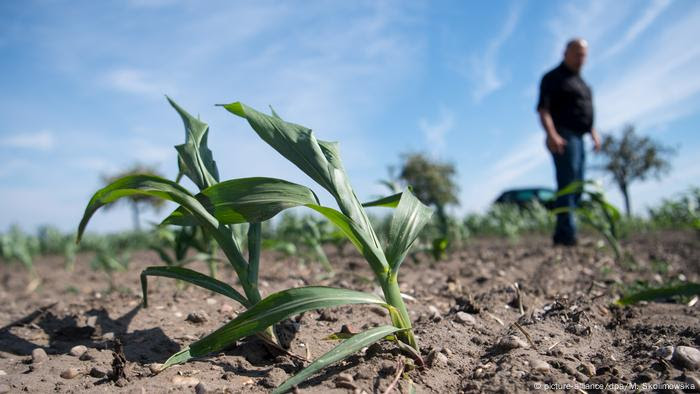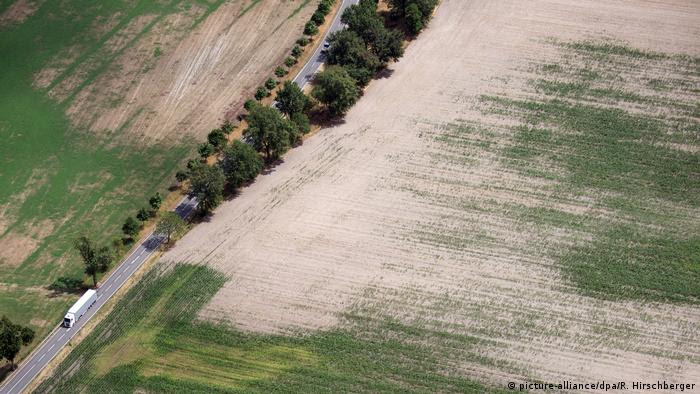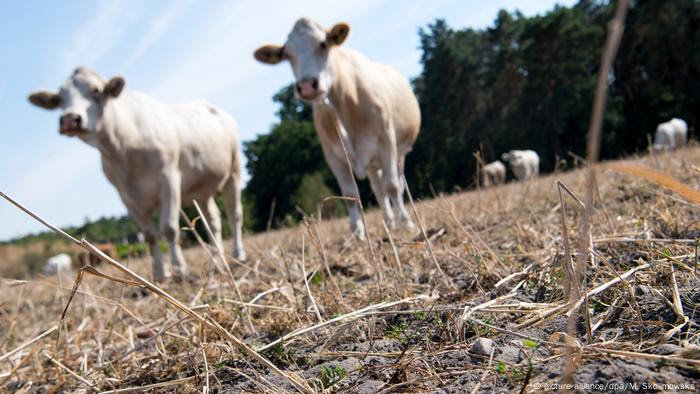|
DW: So we’re facing this global heat wave and it’s impacting farmers. How are they coping?
Alex Jones: It’s very hard for farmers to cope once you’re midway through a [farming] cycle, especially if you’re on a long cycle crop like cereals.
If you planted wheat or maize, once it’s in the ground there’s absolutely nothing you could do except maybe irrigate a bit more. But even that’s not going to reduce the wilt.
It’s more about having better information, putting in seeds that are more resilient. And especially about spreading your risk, and not focusing exclusively on one crop, but multi-cropping.
And increasing biodiversity in the field, so that there are different crops, and you hedge your risk against total failure.

Monculture cropping suffers under extreme conditions
DW: Could drought cause food shortages and famines in the years or decades to come, and what regions are most at risk?
Absolutely, yes it can of course cause famines. The FAO estimate is that we have 830 million people who are currently food-insecure. They do not have enough food to eat, without this kind of shortage.
We also know that we produce more than enough food in the world to feed everybody. But there are redistribution problems, and about one-third of all food is lost at the transformation stage. So there is a lot of slack to be picked up there; but obviously, decreasing production could be a major factor.
We’re also looking at the issue of nutrient depletion.
Climate change, CO2 changes in the air, are having an impact on the nutrient content of food. Some cereals have about 10 percent less protein, and they have less minerals and less vitamins. So it’s not just a question of how much food, but also the quality of that food.
DW: Is drought going to become the new normal for farmers?
Unfortunately, variability is going to become the new normal. So too much rain one year, drought the next year, freezing temperatures the next year, and then a really good year the next. That’s the biggest problem.
If we had a constant trend or we knew that the temperature was going to go up by 2 degrees and stay there, we could deal with that, 2 degrees is manageable.
The problem is variability. Extreme weather events — cyclones, hurricanes, rainfall, hail fall, high temperatures in August in northern Europe.
The unpredictability is the hardest element, and it seems that unpredictability is here to stay.
DW: The solutions are within our reach. But why aren’t they being tapped into?
Well, they’re expensive, and farmers are already often very stressed in terms of barely making a profit. And of course in a year like this, where they’re probably going to lose money because of the drought, if we were to come in and say: “Well, we want you to invest more money in limited tillage or zero-tillage equipment,” of course they’re going to say, “You’re crazy, I’m already in debt.”

GERMANY’S HEAT WAVE: SHINING SUN AND BURNING FIELDS
In northeastern Germany, there has been hardly any rainfall in recent months. The country’s weather service says Saxony-Anhalt received just 15 liters of rainfall per square meter — roughly a quarter of the average. Across Germany, there were just 50 liters of rainfall per square meter, half of the usual amount. Mecklenburg-West Pomerania received more sunshine than any other German state.
It’s about finding the collective will, and making sure that everybody is on a level playing field, because of course if the farmers in Germany do this but their neighbors in another country don’t, then they’ll be at a competitive risk. We all need to agree on certain standards so that it’s a level playing field and we can make these investments.
DW: Farmers in some regions of Germany are facing crop losses of up to a quarter. Most are able to draw from insurance schemes to help cover these losses. But how can insurance work when the losses occur year after year, as might start happening?
Insurance premiums will go up. That’s the basic functioning of insurance: The higher the risk, the higher the premiums. So the question at some point is, will farmers be able to afford insurance?
Will it be worth their while if the premiums are so high? And that’s a major concern, because some of that is underwritten by government support as well.
So we might see an insurance systems fail if they’re unable to cope. And of course, we’re very concerned about all the nascent crop insurance schemes that we’re trying to help support in developing countries because they very much need these.

Farms in northern Germany have been wracked by drought this summer
DW: Did the Paris Agreement include the agricultural sector?
Unfortunately not. The Paris Agreement did not mention agriculture. However, since then there’s been huge progress. There was a big discussion at the COP22 called the Marrakesh Partnership which agreed to come up with an agricultural component.
And at the COP23 last year in Bonn, there was what is called the Koronivia Joint Work on Agriculture, which is an agreement that all the parties to COP will work together for two years on five focus areas in agriculture, and come up with standards to be included in the Paris Agreement on agriculture.
DW: So there are things in the works, but the world just needs to come together to coagulate on it?
What we need is to speed it up because we don’t have two decades to work on this. We really need to get results within a few years. Otherwise it will be too late.
ORIGINAL ARTICLE LINK
Alex Jones is director of the United Nations Food and Agriculture Organization’s Climate and Environment Division.
The interview was conducted by Sonya Diehn, and has been edited for length and clarity. |
0 Comments
Trackbacks/Pingbacks